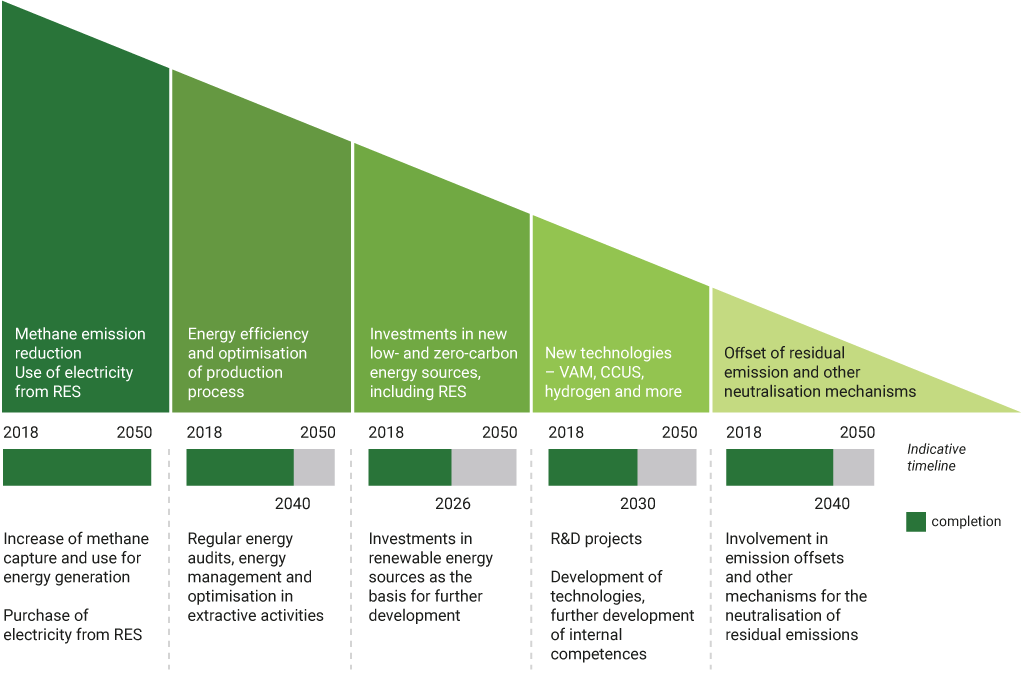Environmental strategy
On 25 February 2022, the Management Board of JSW adopted "JSW Group's environmental strategy to 2030 with an outlook to 2050." The core aim of the Environmental Strategy, which is part of the business strategy, is to clarify JSW Group's role in the environmental, energy and climate transition of Poland and the European Union in response to the changes in the external environment - regulatory and technological and market environment.
The overriding objective for tackling climate change will be to move towards climate neutrality by 2050. The Group's medium-term goal is to reduce carbon footprint (Scope 1 and 2) by 30% by 2030, compared to 2018, in line with the path to <2⁰C from the Paris Agreement.
In light of the fact that 74% of JSW Group's carbon footprint consists of methane as an associated fossil in the coal mining process, a methane emission reduction program until 2025 was developed, taking into account the methane economic utilisation program implemented to date and new measures necessary to achieve the assumed methane capture level of approx. 50% and ensure that 95% of it is economically used.
In addition, measures are planned for the further optimisation of electricity consumption and improvement of energy efficiency, development of own RES capacity and increasing the share of "green energy" in the volume of energy purchased from the market. Innovative and development initiatives related to the reduction of ventilation air methane (VAM) emissions are also planned.
Four key areas of pro-environmental and pro-climate measures have been identified:
Activities of the JSW Group for environmental protection
Air protection and emissions reduction
- Reducing greenhouse gas emissions in line with the Paris Agreement.
- Alignment of facilities with environmental emission requirements under the best available techniques (BAT).
- Further optimisation of energy consumption and use across JSW Group's operations.
- Successful implementation of the investment projects planned at JSW Group covering the main sources of emissions until 2030 and continued development of innovative emission reduction technologies for further neutralisation until 2050.
- Diversification of JSW Group's business based on low-emission and taxonomy-aligned products and services.
Striving for circular economy
- Continuing activities aligned with circular economy priorities and the 5R rules (Refuse, Reduce, Reuse, Repurpose, Recycle).
- Reducing the amount of waste generated.
- Planning and developing improved waste management options.
- Producing and selling mine rock aggregates,
Land rehabilitation
- Carrying out land rehabilitation along with the progress of longwall works.
- Rectifying mining damages.
- Inventorying transformed and post-industrial sites, developing projects to revitalise them or to use them for infrastructure construction, e.g. renewable energy sources.
Protection of water resources and biodiversity
- Continuing activities in the field of rational water management.
- Protecting surface waters under the influence of JSW Group related to the discharge of saline waters from mining activities.
- Investing in the development and optimisation of infrastructure operations to enable more effective protection of water resources.
- Implementing projects enabling the restoration of biological and natural diversity in areas affected by the activities of JSW Group.
JSW GROUP’S CLIMATE OBJECTIVE
Air protection and reducing emissions
COMMITMENT: The JSW Group strives to reduce greenhouse gas emissions by at least 30% by 2030 vs. 2018 (at <2oC according to the Paris Agreement) and to achieve climate neutrality no later than by 2050*
Climate objectives
| KPI | 2018 | 2030 |
|---|---|---|
| Reduction of GHG emissions in Scopes 1 & 2* (vs. 2018) |
- | -30% |
| Level of methane capture | ~33% | To be updated in 2024 after new methane release forecast are adopted |
| Level of utilization of captured methane | ~57% | >95% |
| ZPurchase of RES electricity (beyond the needs covered by own production) | 0% | 100% |
| Energy savings volume (above- ground infrastructure) | - | To be determined after the next energy audit is carried out |
ACHIEVEMENTS AND PENDING PROJECTS
- The capture and economic utilization of methane for energy production in 2021 was approx. 98.6 million m3 of methane annually, which is equal to approx. 1.98 million Mg CO₂e
- Execution of the energy project entitled “Economic Utilization of Methane” (increase of production capacity) to 60 MW
- Modernization of coke oven batteries
- Construction of a 28 MWe power unit
- Enhancing energy efficiency
- Modernization of conditioning air systems
- Investments in PV projects
COMMENTARY
As a supplier of a critical raw material, we recognize the key role of the JSW Group in the transition of the European economy towards climate neutrality.
As a Group we strive to achieve climate neutrality by 2050 and as a medium-term objective we want to reduce the Group’s carbon footprint by at least 30% until 2030.
(Scope 1 and 2, vs. 2018).
The JSW Group will pursue the ambition of achieving climate neutrality by 2050

Environmental Strategy in JSW Group’s business model
PLANNED EXPENDITURES UNTIL 2030 ~ PLN 4.3 billion
- Air protection measures, including adaptation to BAT requirements ~ PLN 3.7 billion
- Water protection measures ~ PLN 0.5 billion
- Measures associated with rational management of waste and reclamation of land ~ PLN 0.1 billion
GOVERNANCE SYSTEM
- Allocation of responsibility for climate issues
- Extension of activities of the Environmental Emissions Team
- Implementation of climate risk management to current processes of the ERM system
COMMUNICATION AND REPORTING
- Adjustment of ESG reporting to new requirements. Reporting compliant with TCFD guidelines
- Readiness to disclose Scope 3 emissions from 2023
- Reporting of taxonomy of JSW Group’s operations
- Participation in specialist ratings concerning ESG and climate issues
